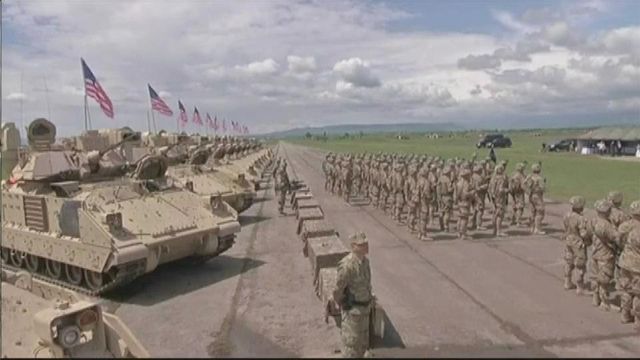Military ban on transgender troops lifted by Pentagon
Saying it's the right thing to do, Defense Secretary Ash Carter announced Thursday that transgender people will be allowed to serve openly in the U.S. military, ending one of the last bans on service in the armed forces.
Posted — Updated"Americans who want to serve and can meet our standards should be afforded the opportunity to compete to do so," said Carter, laying out a one-year plan to implement the change. "Our mission is to defend this country, and we don't want barriers unrelated to a person's qualification to serve preventing us from recruiting or retaining the soldier, sailor, airman, or Marine who can best accomplish the mission."
Under the new policy, by Oct. 1, transgender troops already serving should be able to receive medical care and begin formally changing their gender identifications in the Pentagon's personnel system. And, a year from now, the military services will begin allowing transgender individuals to enlist, as long as they meet required standards and have been stable in their identified genders for 18 months.
Carter's announcement comes despite concerns from senior military leaders that the department is moving too fast and that more time is needed to work through the changes.
Pastor Derrick Montgomery with Blessed Family of God Church in Fayetteville, which welcomes the LGBT community, said the recent announcement is a big statement on the part of the United States military.
"I have watched the military overcome some major obstacles and barriers," Montgomery said. “If you are going to defend our country, the least we can do is allow who you are and recognize you for who you are."
According to defense officials, the military leaders, including Gen. Mark Milley, the Army chief of staff, and Gen. Robert Neller, commandant of the Marine Corps, said that while they aren't opposed to lifting the ban, they thought the new rules didn't include enough specifics to guide commanders who will have to make decisions about people in their units.
Carter said he discussed the plans extensively with his military leaders and that, based on their recommendations, he made adjustments to the timeline. He said he has been told that the services now support the timeline.
According to Carter, a study by the RAND think tank found that there are between 2,500 and 7,000 transgender service members in the active duty military, and another 1,500 to 4,000 in the reserves.
"Although relatively few in number, we're talking about talented and trained Americans who are serving their country with honor and distinction," said Carter.
Under the new policy, transgender troops would receive any medically necessary care including surgery, Carter said.
The new rules give military commanders broad flexibility, noting that not all transition cases are the same. Commanders will have the discretion to make decisions on a case-by-case basis, including on job placement, deployments, training delays and other accommodations, based on the needs of the military mission and whether the service members can perform their duties.
For people coming into the military, the plan says that those with gender dysphoria, a history of medical treatments associated with gender transition and those who have had reconstruction surgery may be disqualified as military recruits unless a medical provider certifies that they have been clinically stable in the preferred gender for 18 months, and are free of significant impairment. And transgender troops receiving hormone therapy must have been stable on their medications for 18 months.
The policy provides guidelines for transgender service members currently in the military. They will be able to use the bathrooms, housing, uniforms and fitness standards of their preferred gender only after they have legally transitioned to that identity.
Over the next year, the military services will develop and distribute training guidelines, medical protocols and other guidance to help commanders deal with any issues or questions about transgender troops.
The military policy differs from civilian gender transitions, where transgender individuals often dress, live socially and work fulltime in their preferred gender during the process. Under the new policy, service members would only be able to do that when off-duty and away from their duty station.
Last July, Carter said he intended to rescind the ban, calling it outdated. He has long argued that the military must be more inclusive to bring in the best and brightest.
At the time, he ordered a six-month study to include extensive medical and scientific research and discussions with other nations and companies with experience in the process. He extended the study because the military wanted more time. Officials said he wanted to ensure there was no impact on military readiness, but over time, he became frustrated with the slow progress.
Rep. Mac Thornberry, R-Texas, the House Armed Services Committee chairman, called the announcement another example of the administration "prioritizing politics over policy." He questioned whether the change would affect military readiness and said the committee will push for answers.
Others praised the move as historic. Aaron Belkin, director of the Palm Center, a research institute at the University of California, Los Angeles, said the decision enhances "readiness as well as core values of honesty and integrity, an enormous accomplishment with a durable impact on all service members."
• Credits
Copyright 2024 by WRAL.com and the Associated Press. All rights reserved. This material may not be published, broadcast, rewritten or redistributed.





